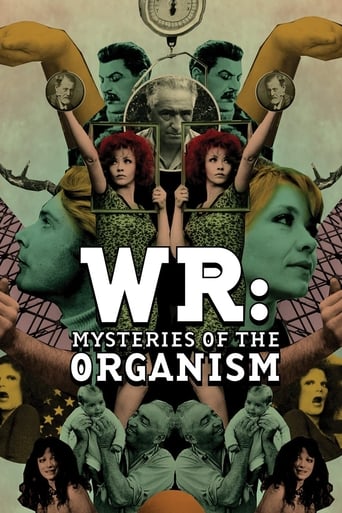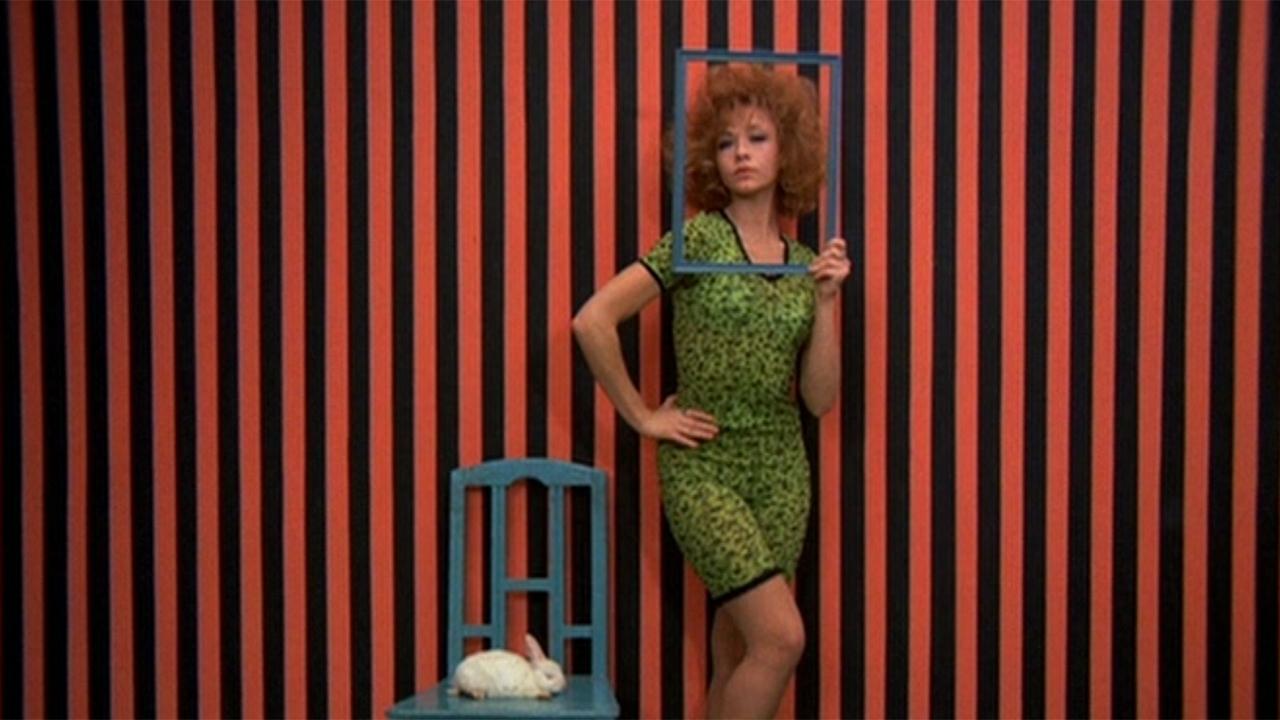Michelle
First, in a documentary type format, the movie has us listen to the writings of a radical free thinker, Wilhelm Reich (WR), and his followers who believed in his teachings that sexual liberation and the power of the orgasm can release healing properties and a higher consciousness. We watch odd experiments with psychology patients and listen to interviews with psychologists. We later learn how WR was imprisoned for his ideas and died in prison. His writings were banned and burned by the American legal system. We also watch a plot-based storyline highlighting two characters in Yugoslavia. One, a sexy brunette whom we meet in the midst of a long intercourse session with a "comrade." She may have a couple of lines, but basically her role is as the roommate who is very sexually active. The other lead is redheaded Milena who proclaims loudly that all should be liberated from sexual repression. She has an image of Reich hanging in her apartment as well as one of his "orgone machines" which we've learned unleashes sexual energy for health reasons. (I swear I saw one of these machines in a Woody Allen movie, but I can't place it.) We can assume that Milena is a follower of Reich's teachings, and the storyline allows us to witness her attempt at raising awareness to sexually liberate those around her. Did I mention that Reich wrote a book on how fascism is a symptom of sexual repression? Ironically, Milena does not have much sex in the movie. She is more the idealist. She does, however, attempt to love a Russian skater who calls himself "The People's Artist." He is in costumed regalia when we meet him and seems oblivious to Milena's advances. Eventually she wins him and he is so shocked by his feelings that he cuts off her head with his skate. He then laments with a song. Not to worry though because Milena lives on as a talking head.Interspersed between the documentary and storyline are images of Stalin in all his glory with troops and flags, videos of water-boarding and electric shock experiments on patients, interviews with an artist who makes casts of erect penises, and interviews and video clips of a transvestite walking the streets, among others. My favorite are clips of a man (Tuli Kupferberg of The Fugs) who dresses himself in flamboyant soldier garb and walks populated streets in the U.S. Other clips and their references are lost on me. Rosenbaum delineates some of them in his essay, including some references to songs, bands and artists.The Russian skater is alienated from his true self, that of a human capable of loving and procreating. This unnatural state, which Milena is trying to make him aware of, is like the repression of the working class, which political systems, such as Stalinism, attempted to force awareness on the people.Exposing the mechanisms perpetuating a system of repression does not lead to rebellion, it leads to death. We witness the idealism of Reich result in his persecution; the advances of Milena to liberate the Russian skater from sexual repression result in her beheading; the grandeur of Stalin resulting in painfully hideous and difficult to watch experiments on the people (and, as we know, the deaths of millions.)It's as if our denial of the system cannot be told to us – it must manifest naturally. The rebellion against the class system must be done intrinsically, of one's own realization and doing. Preached ideals rarely result in overwhelming rebellion from the bottom up. Most choose the blissful ignorance of the blue pill, leaving men to patrol the streets from, what? (cue scenes of Tuli Kupferberg walking populated US streets in full soldier garb, with weapon, as people either ignore him or are mildly amused. The Fugs' "Kill for Peace" is playing and the scene ends with Tuli stroking his weapon.)Perhaps my conclusion is tainted, being that I am looking back on this movie decades later, knowing the results of the 60s sexual revolution, Stalinism and the cold war. I do believe that one leaves this movie a bit disheartened. Some visuals leave lasting impressions such as Reich's works being incinerated, or our heroine, Milena's, decapitated head after attempting to free the Russian skater from a loveless life. Her voice lives through a talking head, as do Reich's in the footage shown, but what of those who accept their plight, unaware of their need for liberation? Will the rebellion ever manifest? Will love and the power of the orgasm uproot the underlying mechanisms that Marx claims requires an uprising? What have we learned since then?amovieacountryajourney.com
Boba_Fett1138
Silly me I suppose. I had no idea what I was in for. I knew nothing about the movie and it caught me off guard.At first I though this was being one of those artistic documentary like movies, in which a whole bunch of people are having deep thoughts about life and happiness. It took me a while to realize that it were all characters in this movie and it wasn't being a documentary at all. It's more a sort of satire and if you take it that way this movie is being pretty bearable and good enough for what it is.Not that this movie is just for everybody though. It's the sort of cheaply made artistic movie, that's filled with metaphors and doesn't necessarily following a main plot line in it. Some people will hate it, while others shall absolutely love it. I was stuck in the middle somewhere.Thing I liked about this movie is that it's also being the sort of movie that makes you think. It makes you think about what you're seeing and what the characters in it are trying to tell you with their actions and pieces of dialog. It's probably true that you could keep watching this movie over and over again and get more- or completely different things out of it, each time you watch it.But it's still not my cup of tea. It's being a bit too vague and odd all at times and most of its themes don't even feel all that relevant anywhere in today's world and present morals and standards. Perhaps you should look at it more as a period piece, from a time when there still was sexual repression and communism and capitalism still seemed like a real threat to the world.Still a great watch for some people. Just not for me.6/10 http://bobafett1138.blogspot.com/
catsoup
The movie consists of seemingly unrelated footage of 1.Stalinist propaganda cinema 2.Interviews and documentary footage on Wilhelm Reich 3.Explicit performance art footage 4.An American rock star (Tuli Kupferberg) wandering around New York with an assault rifle with anti-war poetry being read off-screen5.Original footage containing -a uniform-clad women proclaiming pseudo-communist pamphlets (f.e."celibacy is counterrevolutionary!") inspired by Wilhelm Reich's ideas, -a Yugoslav steelworker in dire need of a sex condemning the "red bourgeoisie" -an uptight Russian sportsman named Vladimir Ilyich reciting V.I.Lenin's writings. They interact in quite delirious sketches which contain some violence and naked skin and some humping. The walls are decorated with Freud's and Hitler's portraits as well as with commie agitprop and Hollywood movie posters. Neither the plot nor the dialogs make sense. A huge part of the movie is not in English, but with white hardcoded subtitles. At times they blend with the background becoming unreadable, but as a fluent speaker of Croatian and Russian I can assure you that that too was just another of the quirks intended by the author.
Nazi_Fighter_David
The plot concentrates on Wilhelm Reich's controversial vital energy
Reich believes that unless a mysterious universal phenomenon called "orgone energy" is discharged naturally through sexual union, obsessions and compulsions will erupt...The film is a collection of these sorts of neuroses, done with exceptional skill and comic action, set in modern-day Yugoslavia
The main character is Milena Dravic, who shouts from her heavily populated apartment: "Politics is for those whose orgasm is incomplete!" Complimenting the idealistic Milena are two female sexologists who are obsessed with the physical nature of human relations...The film is a blast at repression of any kindpolitical or moraland a poem to uninhibited sexual intercourse... Repression sickens and enslaves, whereas nature's physical pleasure sets the human spirit free
There is an abundance of vivacious sexual encounters, much nudity, and constant immersing into other social taboos, but the film's coup de grâce is a natural mixing of erotica, humor, and politics...


 AD
AD



